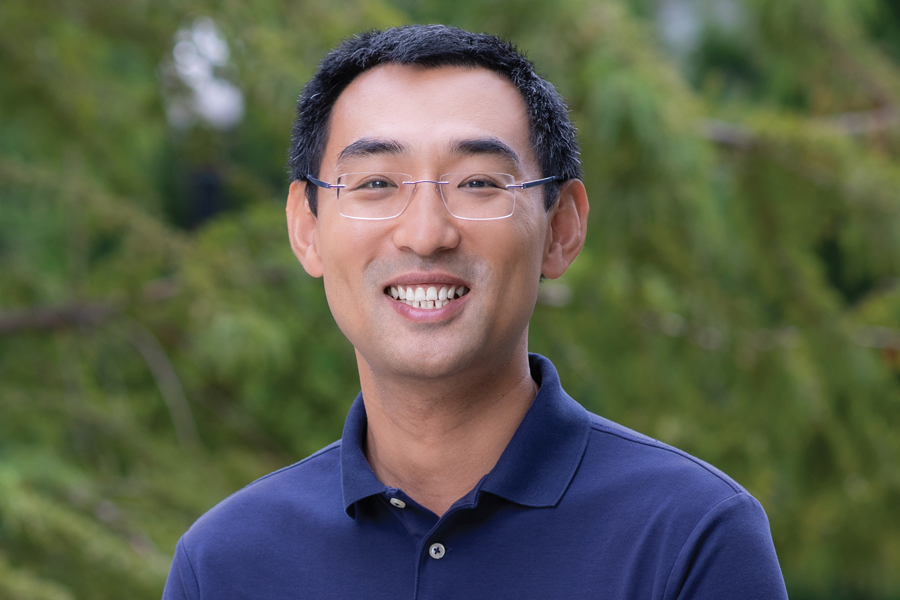Advancing AI
Applied mathematician Feng Bao develops artificial intelligence models to improve Earth, climate science

Artificial intelligence plays a key role in our daily lives, from car GPS technology to iPhone’s Siri to Google search result overviews. For scientists, though, AI isn’t just about answering a simple question — its capabilities enable them to unlock new avenues to analyze the complex phenomena underlying Earth’s climate.
Existing AI systems can predict weather events, map deforestation, track icebergs and their melt rates, identify pollution and more. While Siri can’t halt a hurricane in its tracks, what if AI could be used to mitigate the ramifications of these natural disasters?
Feng Bao, the Timothy Gannon Endowed Associate Professor in Florida State University’s Department of Mathematics, is currently developing privacy-preserving and energy-efficient AI models that tackle a range of public-facing climate issues and assist in the preservation of collected green energy such as wind, wave and solar power.
“I’m looking to solve pressing problems facing scientists and the general public,” Bao said. “By creating foundation models, which are machine learning models that can be used across a wide range of applications because they’re trained on broad data, we’re building a key component of AI and can assist scientists in a number of ways.”
Bao is currently leading six major projects funded by the Department of Energy as well as the National Science Foundation, all focused on developing AI models to improve science. Funding for some of these initiatives is directed by the White House’s executive order for the Safe, Secure, and Trustworthy Development and Use of Artificial Intelligence, which supports work to develop foundation models for science and privacy-preserving AI technologies.
Under one $5.4 million DOE grant, Bao is working with meteorologists, environmental scientists, computer scientists, engineers, physicists, material scientists, and scholars across six research institutions to develop models for scientists to use in their research. He’s currently creating a model that improves accuracy of hurricane and intensity forecasts, a pressing issue in light of the extremely active 2024 Atlantic hurricane season, and models that inform preparations about securing and storing renewable energy, which can become difficult to use or inaccessible in certain weather conditions.
“Almost every scientific, engineering, or technology theory can be traced back to a math theory. I hope to serve as a bridge between abstract math concepts and the science and engineering used to solve real-world problems.”
— Feng Bao
“Just knowing the math isn’t enough to tackle issues this big,” Bao said. “We need a large, interdisciplinary team to work together and combine our areas of expertise. We’re also working with community partners and researchers at places like the National Oceanic and Atmospheric Administration, as well as meteorological agencies in countries around the world, to understand exactly what different communities need.”
Bao, who earned his bachelor’s degree in mathematics from Zhejiang University in Hangzhou, China, before receiving his doctorate in mathematics from Auburn University, came to FSU as an assistant professor in 2018. He’s also the first FSU mathematics faculty member to have earned a National Science Foundation Faculty Early Career Development Program Award, or CAREER Award, which he received in 2022 for his work in designing efficient algorithms.
“Feng contributes to fostering a culture based on determination and the pursuit of excellence,” said Ettore Aldrovandi, Department of Mathematics chair. “He brings in a culture of ‘big science,’ which brings us closer to other STEM departments. As an excellent applied mathematician, he has a unique ability in building and coordinating large research projects that integrate contributions from many students he mentors.”
In this culture of big science, it’s essential for Bao to work side-by-side with other researchers to ensure the models are trained on accurate data and approach problems from different perspectives.
Conventional models ingest massive amounts of information, including observational data such as temperature, wind speed, air pressure, and other points measured on the ground and in the air by meteorological instruments. However, the data doesn't change the way the model itself works. A dynamic model, like Bao creates, adapts to continuously solve new problems as it takes in new, relevant data. Developing dynamic — generative — models allows scientists to make predictions for exact geographic locations in a certain set of atmospheric conditions and account for estimated conditions, both of which are necessary to forecasting impending weather events.
If a model predicts a natural disaster, like a hurricane, based on real-time, local data, both emergency responders and citizens can have more time to prepare. Bao’s models will also be scaled for use in supercomputers, which further optimize the models and allow for wider use, in national laboratories around the U.S. including Oak Ridge National Laboratory where Bao worked as a postdoctoral researcher from 2014 to 2016.
“Math is the basis of so much science, and it’s a common ground for collaboration,” Bao said. “Almost every scientific, engineering, or technology theory can be traced back to a math theory. I hope to serve as a bridge between abstract math concepts and the science and engineering used to solve real-world problems.”
McKenzie Harris is a two-time FSU alumna who earned a master’s degree from the College of Communication and Information in 2022 and a bachelor’s degree from the Department of English in 2020.
